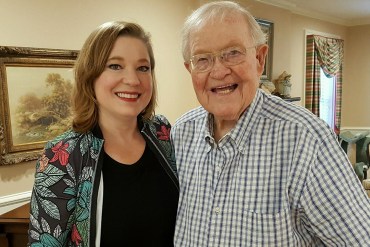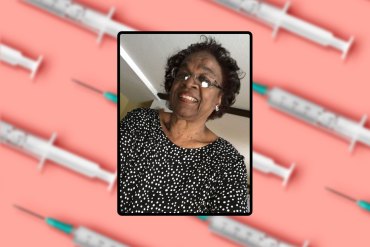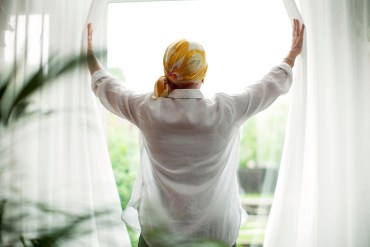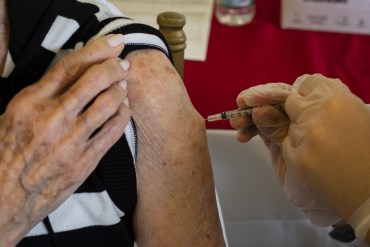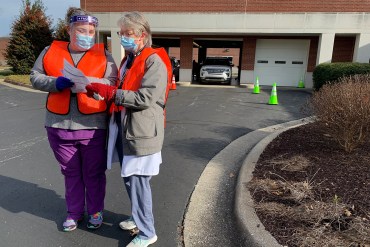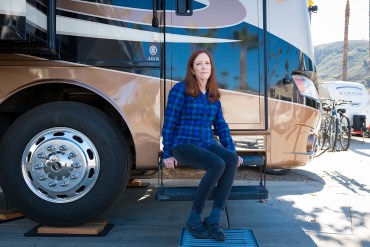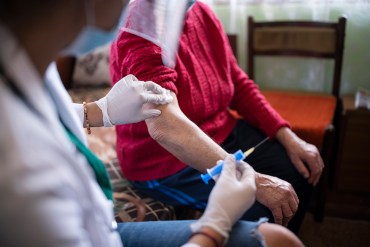Medicare Cuts Payment to 774 Hospitals Over Patient Complications
Renowned medical centers are among the quarter of general hospitals that will lose 1% of Medicare payments for one year because their patients have high rates of bedsores, sepsis and other preventable complications.
California Aims to Address the ‘Urgent’ Needs of Older Residents. But Will Its Plan Work?
State officials recently unveiled a “master plan” to address the needs of California’s rapidly aging population, from housing to long-term care. Kim McCoy Wade, director of the state Department of Aging, vows it will not end up on a shelf gathering dust.
Family Caregivers, Routinely Left Off Vaccine Lists, Worry What Would Happen ‘If I Get Sick’
Tens of thousands of middle-aged sons and daughters — too young to qualify for a vaccine — care for older relatives with serious ailments and want to get the shots to protect their loved ones and themselves.
Vaccine Hesitancy vs. Vaccine Refusal: Nursing Home Staffers Say There’s a Difference
It’s becoming increasingly clear that decision-making about the covid vaccine is complicated and multifaceted, which means persuading people to say yes will be, too.
After Nearly 60 Years of Marriage, This Missouri Couple Stayed Together to the End
Arthur and Maggie Kelley of St. Louis died 30 days apart. Maggie died of complications of dementia in November. Arthur, who had moved into her nursing home to be with her, died a month later of covid. Their family held a double funeral.
‘Cruel’ Digital Race For Vaccines Leaves Many Seniors Behind
Glitchy websites, jammed phone lines and long lines outside clinics are commonplace as states expand who’s eligible to be vaccinated. The oldest Americans and those without caregivers and computer skills are at a distinct disadvantage.
Adultos mayores sin familia o amigos quedan atrás en la carrera por vacunarse
Aunque los datos no están ajustados por edad, los adultos mayores de color han tenido muchas más probabilidades de enfermarse gravemente y morir de covid que los adultos mayores caucásicos
Older Adults Without Family or Friends Lag in Race to Get Vaccines
Public health officials have singled out seniors as key candidates for the covid-19 vaccines but too many of these seniors are not able to get shots because they don’t use computers, don’t have internet services or transportation, or don’t have someone to help them with the process.
At Colorado’s Rural Edges, Vaccines Help Assisted Living Homes Crack Open the Doors
Amid the disorganization and confusion of the vaccine distribution, smaller communities may have an advantage. In some long-term care facilities where vaccination is underway, things are looking up.
If I Have Cancer, Dementia or MS, Should I Get the Covid Vaccine?
Older patients with cancer, dementia or other serious illnesses should check with their doctors, but medical experts recommend the vaccine for most people.
Covid Vaccine Rollout Leaves Most Older Adults Confused Where to Get Shots
Nearly 6 in 10 people 65 and older say they don’t have enough information about how to get vaccinated, according to a new KFF poll.
CVS and Walgreens Under Fire for Slow Pace of Vaccination in Nursing Homes
A federal program that sends retail pharmacists into nursing homes to vaccinate residents and workers has been hindered by bureaucratic hurdles and scheduling woes.
Vaccination Disarray Leaves Seniors Confused About When They Can Get a Shot
As covid cases and deaths soar, it’s difficult to get up-to-date, reliable information about inoculations, and many older adults don’t know where to turn for help. Navigating Aging columnist Judith Graham answers questions from several readers.
Are You Old Enough to Get Vaccinated? In Tennessee, They’re Using the Honor System
In most Tennessean counties, residents currently eligible to get the coronavirus vaccine are health care workers, long-term care residents and people 75 and older. But don’t expect strict enforcement.
Illinois Is First in the Nation to Extend Health Coverage to Undocumented Seniors
As the pandemic hits Latino communities especially hard, Illinois is expanding public health insurance to all low-income noncitizen seniors. Advocates hope other states follow its lead.
Seniors Face Crushing Drug Costs as Congress Stalls on Capping Medicare Out-Of-Pockets
While many private insurers cap what members pay in health costs, Medicare does not. Democrats and Republicans in Congress have proposed annual limits ranging from $2,000 to $3,100. But there’s disagreement about how to pay for that cost cap.
Retiree Living the RV Dream Fights $12,387 Nightmare Lab Fee
A gynecologist in Carlsbad, New Mexico, tested the 60-year-old grandmother for various sexually transmitted infections without her knowledge. Her share of the lab fee was more than $3,000.
With Vaccine Delivery Imminent, Nursing Homes Must Make a Strong Pitch to Residents
More than half of long-term care residents have cognitive impairment or dementia, raising questions about whether they will understand the details about the fastest and most extensive vaccination effort in U.S. history.
Alzheimer’s Inc.: Colleagues Question Scientist’s Pricey Recipe Against Memory Loss
Dr. Dale Bredesen is a well-known, well-respected neurologist. But his colleagues think the comprehensive Alzheimer’s program he’s marketing through a private company is a mixture of free-for-the-asking common sense and unproven interventions.
I Found My Secret to Feeling Younger and Stronger. The Pandemic Stole It Away.
What’s a 67-year-old to do when COVID-19 shuts down the volunteering gigs that were his personal fountain of youth?





